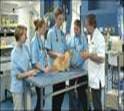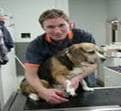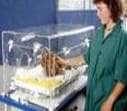INTRODUCTION
Veterinary medicine is informally as old as the human/animal bond but in recent years has expanded exponentially because of the availability of advanced diagnostic and therapeutic techniques for most species. It is the science which diagnoses, treats and cures the diverse types of diseases in birds and animals.




Veterinary science helps safeguard human health through the careful monitoring of livestock, companion animal and wildlife health. Animals nowadays often receive advanced medical, dental, and surgical care including insulin injections, root canals, hip replacements, cataract extractions, vaccinations and pacemakers. They also take part in protecting the public from exposure to diseases transmitted through animals by 'selection breeding' and artificial insemination. Veterinary specialization has become more common in recent years. Currently 20 veterinary specialties are recognized by the American Veterinary Medical Association (AVMA).In order to become a specialist, a veterinarian must complete additional training after graduation from veterinary school in the form of an internship and residency and then pass a rigorous examination.Zoologic medicine, which encompasses the healthcare of zoo and wild animal populations, is another veterinary specialty that has grown in importance and sophistication in recent years as wildlife conservation has become more urgent.
Employment opportunity for veterinary doctors is vast. Several career opportunities are available with different level of placements. They can get employed in any of the following areas
• Government animal husbandry departments
• Poultry,dairy,sheep and dairy farms
• Private and government veterinary hospitals and clinics
• Wildlife sanctuaries zoological parks
• Private Practice
• Teaching
• Research
• Agribusiness
• Pet food manufacturing industries
• Milk and meat products processing industries etc.
Off-stream Jobs for Veterinarians.
• Animal care and service workers
• Biological scientists
• Chiropractors, Dentists, Optometrists, Podiatrists. Specialists
• Pharmacy research scientists
• Veterinary technologists and technicians

Theiler, the father of veterinary science in South Africa, was born in the village of Frick, Canton Argau, Switzerland on 26 March 1867. He underwent his higher education, and later qualified as a veterinarian in Zurich. At this point in the history of South Africa his profession was not really known and any facilities for research or investigation non-existent. In 1891 Theiler packed his bags, few books, microscope and surgical instruments and left by boat for the Cape. From there he travelled by train and mail coach to Pretoria where he took up his first job as a farm hand at Irene Estates. It was on the farm that he lost his left hand in a chaff cutter. At the end of 1891 he started practicing as a vet in Pretoria. He offered to prepare a vaccine to combat an outbreak of smallpox among mine workers on the Witwatersrand in 1893 thereby establishing his reputation. This success led to his appointment by President Paul Kruger as state veterinarian for the Zuid-Afrikaansche Republic (Transvaal) in 1896, and he was officially sworn in on 11 May 1896. Coupled to his success were his boundless determination, energy and exactness, which were soon to earn him worldwide respect for his knowledge and professional service.
During these years (1896) the dreaded disease rinderpest terribly minimized the cattle population. In a teamwork effort he succeeded in developing a vaccine by means of which the disease was eliminate in 1897. He was an outstanding researcher, administrator and teacher, and he made a lasting contribution to various disciplines both in South Africa and internationally. Theiler submitted a proposal for the establishment of a research institute under a state veterinarian at which the production of vaccines against rinderpest, smallpox, pleuropneumonia, and black-quarter, could be carried out. He further recommended that the disinfection station and stables, which were situated at Daspoort on the outskirts of Pretoria, could be changed into suitable quarters. The submission was approved In March 1898, and he was appointed as the Director of the Bacteriological Institute and later staatsveearts (State Veterinarian) to the artillery of the Zuid-Afrikaansche Republic (ZAR). He served as official veterinarian of the Boer forces during the Anglo-Boer War 1899-1902.
Theiler became the first Director of Onderstepoort, where the main building was completed in 1908. Under his leadership and as a result of his hard work, many local diseases were researched and vaccines were produced. Some of it was exported to the rest of Africa well into the 21st century. In 1920 The Faculty of Veterinary Science was established, thus enabling veterinarians to be trained locally. Before the establishment of Onderstepoort South Africans who wished to qualify as vets had to go abroad for their training. Theiler was the first dean of the faculty.Theiler and his wife Emma had two sons and two daughters. Hans a veterinarian, and Max a scientist who became South Africa's first Nobel laureate in 1951 in Physiology and Medicine, Margaret a teacher, and Gertrude a scientist. Both Gertrude and Max worked at Onderstepoort with their father.Theiler retired in 1927 and died in 24 July 1936. A statue of Theiler, by the distinguished sculptor Coert Steynberg, was erected in front of the Old Main Building at Onderstepport in 1939. The ashes of Sir Arnold Theiler and his wife Lady Emma are stored in the base of the statue.
Horoscope - Career for Zodiac Signs
If you adore animals and get affected to see them in pain, this can be a passionate career option for you. Just check out these sun signs which are in most favour of veterinary science.
 Leo
Leo
 Virgo
Virgo
 Sagittarius
Sagittarius
Eligibility : Click here for more information
Institutes : Some of the prominent institutions offering courses in Veterinary Science can be had from the following links.. Click here for more information